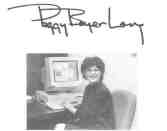EDITOR'S NOTEBOOK 
Saying goodbye to reporter Bill O'Connell by Peggy Boyer Long I moved into the old Statehouse Press Room in January 1975. Richard Nixon's presidency had collapsed. Saigon was about to fall. And Dan Walker was midway through the most tumultuous gubernatorial administration anyone could recall. In retrospect, the day I announced myself to Shelby Vasconcelles, the press corps' seemingly ageless secretary, an era was already slipping imperceptibly away — in the pressroom and in the halls of the Capitol. The "old" pressroom was not, in fact, the oldest. Another had been located on the east side of the Capitol rotunda. We would move into our clean new quarters, on the west side mezzanine, a little more than a year after I arrived. But the pressroom I remember was located one floor above the mezzanine. It is, in memory, cavernous, dimly lit, as it was that first day, layered with dust and newspapers. It echoes with the din of Underwoods and legislative chamber bells. It is inhabited by giants.
Among those giants is Bill O'Connell. After four decades and a year, Bill retired this spring as Peoria's Statehouse reporter. We're pleased to pay tribute to that achievement in this issue of the magazine (see page 22). Retired or no, Bill is still the smartest reporter I ever met. He has dead-bang recall. He knows more about legislative process, and the rules of both chambers, than some — maybe most — lawmakers. And it was really that knowledge, and his awesome power of persuasion, that were at the heart of a legendary ability to look out for his hometown while in Springfield. But if Bill cut a deal or two in his time, he always wrote true. If he worked his sources in bars, he always wrote clean. And he never forgot his readers. Or why he was writing for them. There were others, too, in that old pressroom that I looked up to, learned from. But, as is always the case, there were generational differences among reporters, different ethos for different eras. Indeed, the rules of the game were changing by the mid-'70s. Up to then, lawmakers were part-timers. The parties exercised total control. And reporting was a trade, a craft learned through practice over a lifetime. By the time I arrived, legislators had come to see lawmaking as a full-time career, and Chicago Mayor Richard J. Daley was losing his grip on the Statehouse to Democratic "reformer" Dan Walker. Journalism was beginning to recast itself as a profession, something to be learned in a classroom. Reared on Vietnam and Watergate, reporters of my generation were less inclined than some of our mentors to believe or befriend government officials. We hammered out codes of ethics, debated standards. But we could be righteous. Sometimes we were drawn to meaning at the expense of facts. And, if we kept politicians at arm's length, too often we made the political process itself seem tainted. It's not hard to imagine that Bill and his cohorts found much that dismayed them about my generation of reporters. Just as there is much to be dismayed about today. Now, it seems, the Statehouse is a lower rung on the career ladder to prime time. And in some circles, cynicism about government and its practitioners is considered smart, rather than a limitation or a handicap of the burned-out and the callow. James Fallows has detailed some of the shortcomings of journalism as it's practiced today in Breaking the News. Many of his points are controversial, but some are worth considering: that journalists should be rooted in and write for their communities; that our job is to explain the workings of government and to engage our audiences in the process of democracy. Bill O'Connell did that. Maybe, after all, journalists just need to consider reclaiming some of what we've lost of our traditions. 4 ¦ July 1996 Illinois Issues |
|||||||||||||||
|
Sam S. Manivong, Illinois Periodicals Online Coordinator |
